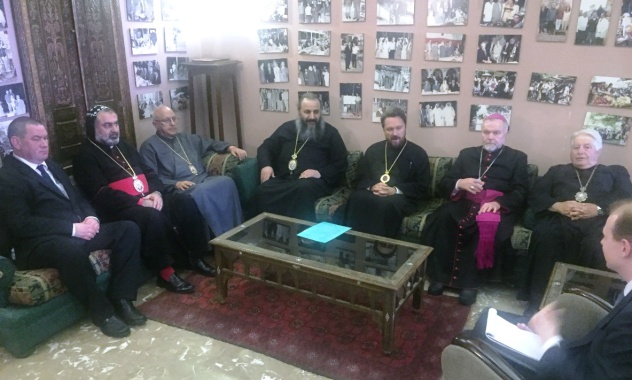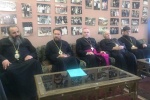Metropolitan Hilarion meets with hierarchs of the Lebanese Churches
September 17, 2017 – Metropolitan Hilarion of Volokolamsk, during his visit to Lebanon, met with hierarchs of Churches in Lebanon who serve in the Bekaa Valley. The aim of the meeting was to discuss the current humanitarian situation in the region and humanitarian initiatives taken by the Russian Orthodox Church including in the context of inter-Christian and interreligious interaction. The Bekaa Valley is the part of Lebanon in which most of the Syrian refugees have found asylum after leaving their native cities and villages caught in a zone of hostilities. Some of them are accommodated in refugees camps, while others, especially Christians, in the cities of Zahle and Baalbek. Local Christian diocese have taken care of these people and, in the recent years, acquired a considerable experience of humanitarian work.
Participating in the meeting were Metropolitan Anthony of Zahle and Baalbek (Patriarchate of Antioch), Archbishop Issam John Darvich of Zahle and Fourzol (Melkite Church), Archbishop Yostinos Boulos Safar of Zahle (Syriac Jacobite Church), Archbishop Elias Rahal of Baalbek (Melkite Church), Bishop Joseph Mouawad of Baalbek (Maronite Church).
Present at the meeting were also Bishop Kirill Klimovich, ordinary of the St. Joseph Diocese in Irkutsk (Roman Catholic Church); Hegumen Arseniy (Sokolov), representative of the Patriarch of Moscow and All Russian to the Patriarch of Antioch and All the East; Archpriest Igor Yakimchuk, DECR secretary for inter-Orthodox relations; Hieromonk Stephen (Igumnov), DECR secretary for inter-Christian relations; and Mr. P Gumenyuk, representative of the Kirche in Not foundation.
Metropolitan Hilarion conveyed greetings from His Holiness Patriarch Kirill of Moscow and All Russia, reminding the meeting that the visit that His Holiness made to Lebanon in November 2011 and his meetings with head of local Christian communities were very important for a correct assessment of the situation with regard to the crisis already that was unfolding in the region at that time. Those meetings laid a foundation for the efforts made by the Russian Orthodox Church in subsequent years for aid to the suffering population in Syria. During this time, many delegations of Middle East Christians and personally Patriarchs of the Orthodox Churches of Alexandria, Antioch, Jerusalem and the Coptic, Syriac Jacobite, Armenian Catholic Churches and the Assyrian Church of the East visited Russia.
Receiving first-hand testimonies concerning the Syrian and Iraqi tragedies, the Russian Orthodox Church made great efforts to draw the attention of the world community to the problem of genocide against Christians.
Concurrently, the Moscow Patriarchate carried out an active work to render humanitarian aid to the population in Syria, involving in it public and charitable organizations. Among the major actions was the fund-raising campaign through donation boxes. The collected money was sent to the Orthodox Church of Antioch.
Supplies of foodstuffs and medicines were delivered to Syria on a regular basis, targeted for both Christian hierarchs and leaders of Syrian Muslims. Several supplies were given directly to churches in Homs and delivered to the Christian Valley.
The need to give urgent aid to Christians of the East became the main reason for the meeting between His Holiness Patriarch Kirill of Moscow and All Russia and Pope Francis, which took place on February 12, 2016, in Havana. It was noted that the call of the heads of the two largest Christian communities was taken by Middle Eastern Christians not only as a sign of hope but also as an incentive for intensifying inter-confessional cooperation on a regular level.
As Metropolitan Hilarion stressed, ‘it is important that Christians in the East should unite their efforts for aid to the suffering compatriots in order to restore peace and accord in their countries. The Russian Orthodox Church will support these efforts’.
Among the practical results of the Havana Meeting was a number of joint projects organized by the Roman Catholic Church and the Moscow Patriarchate with regard to Syria. Thus, already in April 2016, a joint Orthodox-Catholic delegation with the participation of Kirche in Not went to Lebanon and Damascus. The delegation visited, among other things, the refugees in the Bekaa Valley and held round-table conferences with representatives of local churches in Zahle and Damascus.
In April 2017, an interreligious working group was set up for aid to the Syrian population under the Russian Presidential Council for cooperation with religious organizations. It includes both Christians of various confessions and Muslims. In June and August, two supplies of humanitarian aid were delivered to Syria as part of this project. It was distributed to refugees near Latakia, in Aleppo and in one of the de-escalation zones near Homs. The group managed to include in that humanitarian supply a part of the aid delivered for the first time by the Russian center for reconciliation of the warring parties in Syria to the city of Al-Qamyshli. In the end of June, the working group held a round table with representatives of Syrian and Lebanese religious communities in Beirut ‘to synchronize watches’.
Metropolitan Hilarion assured the Lebanese hierarchs that ‘this work supervised by His Holiness Patriarch Kirill personally’ will be continued’.
Then representatives of Lebanese Churches shared their vision of the current humanitarian situation in the region and spoke about the most urgent tasks to be fulfilled to help Syria and its suffering population. The sides considered possible joint projects in rendering aid to Syrian refugees in the Bekaa Valley and agreed to develop cooperation in this area. One of the formats of this work will continue developing in cooperation with the Catholics and the Orthodox in Russia with participation of the Kirche in Not foundation.
DECR Communication Service
Other events
-
18.09.2017 09:39Metropolitan Hilarion meets with hierarchs of the Lebanese Churches
-
16.09.2017 23:41Metropolitan Hilarion of Volokolamsk speaks at the Conference “Russia in the Heart of Lebanon”
-
16.09.2017 23:40Address by Metropolitan Hilarion of Volokolamsk to the Russia in the Heart of Lebanon conference
-
16.09.2017 11:42Metropolitan Hilarion of Volokolamsk meets with Lebanon’s Prime Minister Saad Al-Hariri
-
16.09.2017 07:35DECR chairman meets with His Beatitude Patriarch John of Antioch
-
16.09.2017 05:16Metropolitan Hilarion of Volokolamsk meets with President of Lebanon
-
15.09.2017 21:12Metropolitan Hilarion of Volokolamsk meets with the head of the Maronite Church
-
15.09.2017 14:04Metropolitan Hilarion of Volokolamsk begins his working visit to Lebanon














